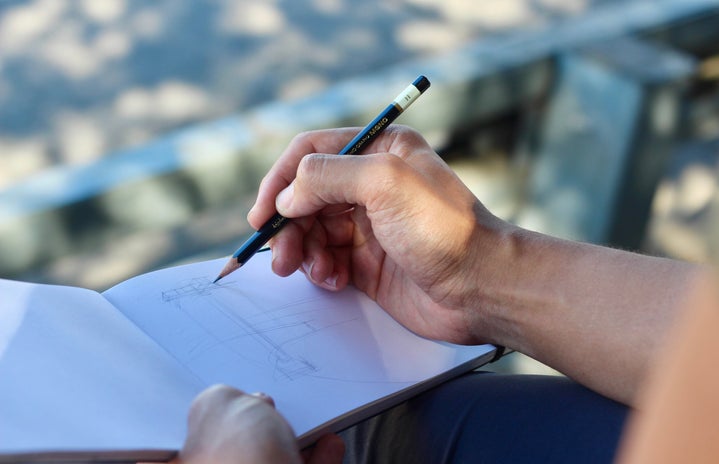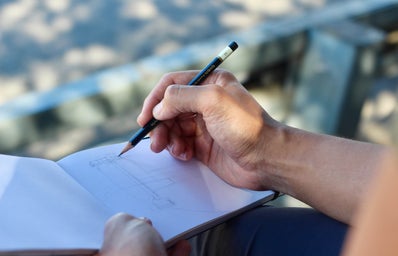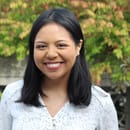My writing career began and ended with a sandwich.
It was your everyday ham-and-cheese that had been sitting in my lunch bag all morning, probably becoming soggy in its plastic wrap. Thinking back, I think it had the crusts cut off.
It was the beginning of the third grade, and, like most third-graders, I knew exactly what I wanted to do with my life. I was going to become a doctor so I could wear that neat lab coat and make people feel better like magic. Then, I would make lots of money so I could buy that huge dollhouse I wanted, because everyone knew that being a doctor meant money, and money could let you do anything. That had been my plan for a while, and in my mind, it was foolproof. That is, until my best friend at the time, Joey, walked over to me and asked what I had for lunch that day.
I knew I had a boring sandwich. I knew it was the same thing my mom usually packed for me. But, for whatever reason, eight-year-old me sitting at my tiny desk in my squeaky plastic chair had this overwhelming urge to make the sandwich sound like it was made by a world-renowned chef.
“It’s a delicious sandwich,” I remember telling him, the gears in my brain turning. The feeling would later become familiar to me. “It has crisp, green lettuce and fresh whole-wheat bread.”
Seeing the intrigue on my friend’s face only encouraged me further. “And thinly sliced ham,” I added, stealing a line from some commercials I had seen on TV. “And even real mayonnaise.”
Though I admit that I cannot remember much from the third grade, I’ll never forget the feeling of pride I felt when my friend said, “Wow. You’re so lucky you have such a good lunch.” His face showed me that he really meant it.
This tiny interaction catalyzed what would be years of me developing as a writer. Knowing that I could use my words to impact others would become my most powerful tool. The stories I enacted with my friends and the fairy tales I imagined with my dolls became words I wrote in spiral notebooks, filling the pages from cover to cover then asking my mother to buy more. I’d stay awake well past my bedtime scribbling disorganized ideas on a notepad I kept on my nightstand. I’d daydream new stories when I was supposed to be paying attention to the world around me. I wrote stories based on characters just like me: short, awkward girls who wanted nothing more than to be pretty and loved, like the popular girls. I wrote stories about characters I wanted to be: young women who had everything figured out, falling in love with someone who loved them back. I even kept a detailed diary inspired by Anne Frank who I had recently learned about in school (a diary I continued for nearly eight years with a word count rivaling most novels).
The only thing to compete with my love for writing was my love for reading.
I’d often come home on Saturday afternoons with my arms piled high with library books. I was on a first-name basis with the librarians there. Soon enough, I could point out entire shelves I had already gone through. I fondly remember the small closet next to my childhood bedroom; filled with books of all kinds for me to choose. I would sit on the floor under our roof’s skylight, leafing through a children’s encyclopedia and learning about places like Paris and Tokyo, or how plants use sunlight, or the lives of ancient Greeks. I knew I wanted to be a writer just like all of the authors whose books filled that little closet. Writing and reading became a passion that fueled me. That is, until I had another lunch with different friends years later.
It was the eighth grade. Everyone was buzzing about high school approaching so quickly. At that age, all of your relatives are asking what you’re going to be when you grow up. Since the third grade, my answer to this was always, “I want to be a writer.” It was a confident answer.
Sitting down with my friends at lunch, we all began discussing our future. Katy had noodles and she wanted to be a brain surgeon. Margaret had chicken and she wanted to work in the science field, too – maybe a researcher or some kind of engineer. I had a sandwich with crusts. And I wanted to be a writer.
“Are you sure?” Katy asked me. Later, I’d try to forget the doubtful edge in her voice. “Everyone’s starting to go into STEM now. That’s where all the jobs are.”
I remember Margaret nodding along, taking a bite of her food. “Yeah. All the successful people are, like, doctors and scientists and stuff now.”
As they continued to talk about the plentiful opportunities in science, I felt my heart sink right into my stomach. All of a sudden, I was no longer hungry, and the only thing I could do was stare at my sandwich.
From that point onwards, I put my love for writing in the corner of my mind. I decided to be successful and wealthy, I needed to pursue science just like everyone else. I started to feel pressure like I never had felt before. The decision to go into STEM without a passion for it would consume me for the next three or four years, and it would hide my burning love for writing and nearly snuff it out.
In high school, I did everything I could to ignore what I loved to do. Soon, my notebooks were only half-filled. They later became completely empty. The stories I had in my head eventually became memories nearly as dusty as my bookshelf. My diary had month-long gaps, and the few excerpts I did write during this period were short and lacked any kind of insight into how I was really feeling. Writing was no longer a joy for me, and instead became a chore. I only wrote for school assignments, not an ounce of creativity to be found.
Pretending to be interested in going into STEM would be the ongoing theme of my high school career.
I’d take advanced chemistry courses, then study hard for all my tests, even if I could hardly grasp the content. I’d stay after class to talk to my teacher about it, and nod along, pretending I understood everything perfectly just so I could get out quickly. I would research expensive science camps and show the brochures to my parents, who were so delighted with my decision to go into science. I’d make myself watch guest speakers talk about scientific theories and concepts, and thought that if I watched enough of them, maybe something would click – that I’d actually start to enjoy them. I would get my parents to buy me books about biology and flashcards about the human anatomy, but wouldn’t even get halfway through without preferring to just do nothing instead. For all these years, it was difficult for me to pretend I really enjoyed STEM. I knew this was far from my true passion, but I thought it was what I had to do to be just as successful as everyone else. Later, as I chose university programs, I would realize potential financial success did not equate happiness – even if it does please your parents, or fir the image of the life you feel you should have.
In the eleventh grade, after taking an Advanced Placement science class, I decided to begin an after-school science club for my school, figuring I might as well embrace my new path. I reasoned that leading this club could make me more interested in science, and maybe everything would come together. I had already waited this long, so surely things will click soon, right? As I planned Periodic Table activities and researched medical advancements, there was a faint tug in my heart telling me I should have started a writing club, or joined the school newspaper. Again, I ignored this ache, forcing myself to smile as I discussed stem cell research with thirty enthusiastic kids in the science club. Matching their enthusiasm left me exhausted on the bus ride home.
The facade peaked when I realized I needed a credit in physics for some science programs at university. In a rushed panic, I ran to my guidance counselor and explained the ordeal and how I absolutely-positively-very-much needed to be switched into the physics class, just in case I needed that credit. She assured me that I would be just fine without it and sent me on my way. Walking out of her office, I realized I had been holding back tears the entire time, and my heart was being tugged again. I went to the bathroom, locked myself in a stall, and furiously collected my tears on my sleeve. I knew I didn’t want this. I knew it.
That night, I lay awake in my bed, wondering if I was making the right decision about anything anymore. I was only 16, but it felt like my fate hung on this one decision. I was anxious and truly scared because I honestly couldn’t picture myself wearing a neat lab coat or learning about stem cells. I also couldn’t picture myself disappointing my parents by doing anything else, either. I was so panicked and I truly cannot recall a time in my life when I had felt more awful than I did laying there alone, wondering if I was going to be successful. One thing was certain: I wasn’t going to be happy if I continued in this path, feeling this way.
The only thing that could make me happy was feeling ink flowing across a page.
So, late at night on a weekday, I sat up in bed, dug out my old notepad, and wrote words to impact someone. In this case, my words impacted me.
I wrote that I appreciated everything STEM has done for our world and the hardworking people who wear those neat lab coats, but I couldn’t picture myself being one of them. There are so many people genuinely and irrevocably passionate about science, technology, engineering, and math, and I respected that. But there are many others, like myself, that do not possess this passion. Instead, they hide their passion deep within them and mask it with a pursuit of science their heart does not match. I knew this because I was one of them. It took nearly four years of my life to realize the world will always need creators. The world will always need artists and craftspeople. The world will always need people who write words to influence others.
Perhaps the funniest part of all of this is that now, as a journalism major at university, I often try to find out what my old classmates are doing. I believe that Margaret is enrolled in art school, planning to become a storyboard artist. Last I heard of Katy, she was studying both math and poetry. Even Joey from the third grade is now a conductor in a music program.
In that old notepad, I wrote down my real plans. “I want to be a writer.” Period. I remember the ache in my chest leaving immediately. I can’t imagine the amount of stories lost in those years I gave up writing, but I was finally happy enough to begin again. Before my final year of high school, I enrolled in a high school summer journalism program, then later won a short story competition. I began writing longer diary entries and asking for books for my birthday.
The words “I want to be a writer” soon became “I will be a writer.”
The feeling of finally writing again matched what I felt when my childhood friend was envious of the lunch I had.
When I finally put down my pen that night, I needed a midnight snack after all that writing. So, I went downstairs to the kitchen and made the best sandwich I had ever tasted.



